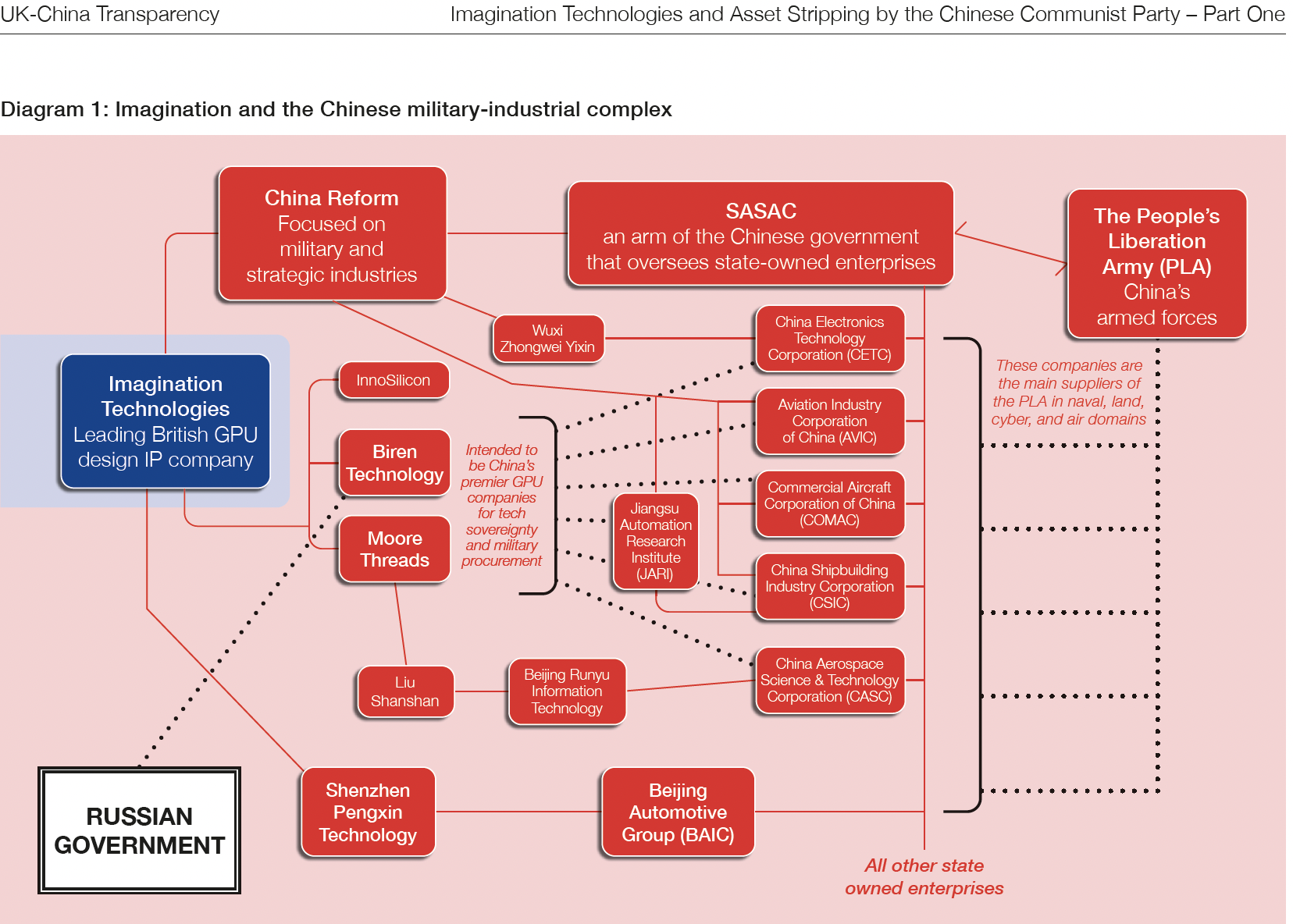A new report by theUK-China Transparencyorganization claims that British company Imagination Technologies has supplied Chinese companies with critical GPU IP technologies that could be used for China’s government, military, and secret service applications.
In the report, UKCT accuses Imagination’s managers and investor Canyon Bridge (which is controlled by China Reform, an arm of the Chinese government) of facilitating the transfer of key technology assets to Chinese companies, which now rival Imagination and other GPU developers. The technology was reportedly transferred toMoore Threadsfor example, which has links to a company that supplies GPUs to China’s military, and Biren technology, which is partly owned by the Russian government.

Imagination Technologies develops graphics and neural processing IP, which it then licenses to clients like Apple. Like some other major IP licensees, it can sell an actual GPU or NPU blueprint (physical IP), explain how to use it, and perhaps even help implement it into a chip design. It can also sell an architectural license, from which its partner would design a GPU from scratch — developing its own execution units (texture units, shader units, render back ends, etc.), data pipelines, cache hierarchies, and interconnects, as well as balancing the whole GPU in accordance with its vision.
Here are two of the four key findings from the report, with further analysis below.

Licensing GPU technologies to China
Normally, Imagination and other IP vendors never transfer key knowledge or explain design decisions to customers. However, UKCT’s source — a former employee of Imagination — alleges this occurred with Imagination’s China-based customers, including Biren Technology (which has received investments from the Russia-China Investment Fund), InnoSilicon, and Moore Threads.
The UKCT source revealed that the architectural licenses sold to Chinese companies comprised three distinct components:

The source felt that, after Imagination’s know-how was transferred to three major GPU developers from China, the company would be shut down. The company did not shut down, but its staff count dropped from 1,100 in 2016 to 804 in mid-2017 (after Apple announced plans to develop its own GPUs) and further to 520 in 2023.
Get Tom’s Hardware’s best news and in-depth reviews, straight to your inbox.
ImgTec denies wrongdoing
While InnoSilicon publiclyacknowledgedusing Imagination’s IP to develop its GPUs,Biren Technologyand Moore Threads claim their processors rely on proprietary architectures. However, it is widely believed that the founding teams from Biren and Moore Threads came from AMD and Nvidia and potentially brought trade secrets with them. (This has not been confirmed, but neither the claims about proprietary architectures nor the assumption of third-party trade secrets preclude the possibility that the underlying instruction set architecture (ISA) or some design decisions originate from Imagination Technologies.)
Imagination Technologies, which is based in the U.K., denies any wrongdoing and claims that its close work with Chinese customers adhered to industry standards for architectural licenses. The company also denied transferring proprietary know-how to its licensing partners.
“Architectural license deals are entirely normal in the semiconductor industry, including for Imagination,” a statement from Imagination Technologies published by UKCT reads. “When we ‘supply IP,’ we deliver technology packages and grant a license to Imagination’s intellectual property rights in that technology to enable our customers to design, manufacture, and sell chips incorporating our technology. […] The specific packages of technology deliverables for standard and architectural licenses vary by customer and end-use case [‚Ķ]. For standard and architectural licensing engagements, training is necessary to help customers understand how to design chips with Imagination Technology and, where relevant, to carry out their own customization for their permitted use only.”
The company further argued that it would not make strategic sense to share all of Imagination Technologies' experience and knowledge with customers, enabling them to design their own GPUs. It also denied transferring its assets to third parties in China. Now that Biren, InnoSilicon, andMoore Threadsare on the U.S. Department of Commerce’s Entity List and Imagination can no longer supply these companies, the Chinese firms likely have to develop new GPU generations independently — probably using a familiar ISA.
Chinese Military Ties?
When China-backed Canyon Bridge took over Imagination Technologies in 2020, it immediately caused a huge controversy because of its ties to the Chinese government — and the potential use of its technologies to enhance China’s military capability and strategic industries. UKCT asserts that Canyon Bridge not only has ties to the Chinese government through its owner, China Reform, but that it also has ties to the People’s Liberation Army, state-owned strategic enterprises, and various Chinese companies that require AI, graphics, and HPC processors for development and production. These companies can collaborate with Biren, InnoSilicon, and Moore Threads — either directly or through intermediaries.
For example, one of Moore Threads' shareholders is Liu Shanshan (also the company’s executive director). Shanshan also serves as a director at Beijing Runyu Information Technology. According to UKCT, this GPU company has supplied products to China Aerospace Science and Technology Corp., a major arms manufacturer in which China reform has a stake.
UKCT plans to release a second part of its investigation, which will focus on export control laws and produce further evidence from an employment dispute involving Imagination’s former CEO, Dr. Ron Black. You canread the full report here [PDF].
Anton Shilov is a contributing writer at Tom’s Hardware. Over the past couple of decades, he has covered everything from CPUs and GPUs to supercomputers and from modern process technologies and latest fab tools to high-tech industry trends.